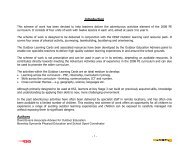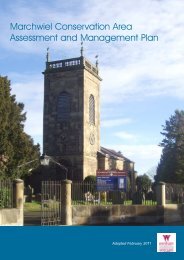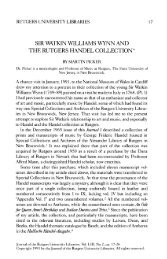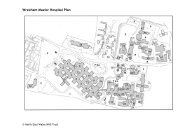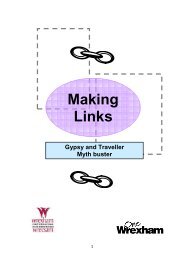flintshire and wrexham local safeguarding children board training ...
flintshire and wrexham local safeguarding children board training ...
flintshire and wrexham local safeguarding children board training ...
You also want an ePaper? Increase the reach of your titles
YUMPU automatically turns print PDFs into web optimized ePapers that Google loves.
FLINTSHIRE AND WREXHAM <br />
LOCAL SAFEGUARDING CHILDREN BOARD <br />
TRAINING STRATEGY <br />
2011-14 <br />
1
Flintshire & Wrexham LSCB <br />
Training Strategy 2011-2014 <br />
1) Introduction<br />
The Training Sub Groups of Flintshire & Wrexham Local Safeguarding Children Boards<br />
(LSCBs) merged in September 2010 as a precursor to the merge of both Boards in April<br />
2011. This document sets out the principles <strong>and</strong> structures underpinning the annual<br />
LSCB <strong>training</strong> programme.<br />
2) Role of the <strong>training</strong> sub group<br />
The LSCB Training Sub Group comprises managers, practitioners <strong>and</strong> <strong>training</strong> staff from<br />
key agencies <strong>and</strong> services involved in working with <strong>children</strong>, young people <strong>and</strong> families.<br />
It meets six times a year <strong>and</strong> is responsible for:<br />
<br />
<br />
<br />
Identifying <strong>training</strong> need across Flintshire <strong>and</strong> Wrexham in relation to <strong>safeguarding</strong><br />
<strong>children</strong><br />
Planning, delivery <strong>and</strong> evaluation of <strong>training</strong> in response to identified need<br />
Monitoring the quality <strong>and</strong> quantity of <strong>training</strong> delivered <strong>and</strong> ensuring that it reflects<br />
sound collaborative practice, current policy <strong>and</strong> guidance <strong>and</strong> recent developments<br />
in knowledge <strong>and</strong> practice methods<br />
3) Principles of LSCB <strong>training</strong><br />
LSCB <strong>training</strong> in Flintshire & Wrexham strives to be:<br />
<br />
<br />
<br />
<br />
Inclusive ie open to all regardless of race, gender, age, culture, religion, ability or<br />
sexuality<br />
Flexible, in that <strong>training</strong> should be available in a variety of ways to reflect the needs<br />
of the audience<br />
Collaborative, encouraging joint working between agencies at every stage of the<br />
process<br />
Child-centred, in that its prime concern should always be the safety <strong>and</strong> welfare of<br />
<strong>children</strong> <strong>and</strong> young people<br />
4) Audiences <strong>and</strong> levels of <strong>training</strong><br />
Training is organised in a modular programme, as set out in Safeguarding Children:<br />
Working Together under the Children Act 2004 (Wales 2006):<br />
<br />
<br />
<br />
Those in regular contact with <strong>children</strong> <strong>and</strong> families (basic awareness <strong>training</strong>)<br />
Those who work regularly with <strong>children</strong> <strong>and</strong> families (working together)<br />
Those with a particular responsibility for <strong>safeguarding</strong> <strong>children</strong> (working together<br />
on complex tasks)<br />
2
In addition there is a responsibility to respond to the <strong>training</strong> needs of operational,<br />
strategic <strong>and</strong> senior managers <strong>and</strong> LSCB members.<br />
Flintshire & Wrexham LSCB avoids the use of numbers (level 1, 2 etc) to designate<br />
programmes, to avoid confusion with other organisations’ structures <strong>and</strong> in particular with<br />
Working Together in Engl<strong>and</strong> which specifies 8 levels of <strong>training</strong>.<br />
5) Single <strong>and</strong> multi agency <strong>training</strong><br />
Basic awareness <strong>training</strong> is the responsibility of the employing agency. It is provided in<br />
this area as follows:<br />
a) Employees of the Betsi Cadwaladr University Health Board receive <strong>training</strong> from<br />
Public Health Wales (primary care) <strong>and</strong> the Safeguarding Team of the BCUHB (all<br />
other staff).<br />
b) Welsh Ambulance Trust staff receive <strong>training</strong> from their Safeguarding Team<br />
c) Public Health Wales staff receive <strong>training</strong> from their Safeguarding Team. This team<br />
also provides <strong>training</strong> for Primary Care <strong>and</strong> some independent contractors. Dental<br />
professionals receive <strong>training</strong> from an external provider which is commissioned by<br />
Cardiff Dental Dept<br />
d) Education staff receive <strong>training</strong> from the ESW Team Manager in their county<br />
e) Police officers receive induction <strong>training</strong> from their organisation<br />
f) The Learning <strong>and</strong> Development department of the Wales Probation Trust provide<br />
some basic <strong>training</strong> for some grades of staff as part of their qualifying <strong>training</strong> but<br />
may from time to time make use of the <strong>training</strong> on offer from the LSCB.<br />
g) Social work staff are expected to have received basic awareness <strong>training</strong> as part of<br />
their qualifying course, <strong>and</strong> are offered an additional induction programme in child<br />
protection<br />
h) Some independent organisations eg voluntary agencies, faith groups, sporting<br />
organisations, the national body provides the appropriate level of <strong>training</strong>. Others<br />
such as Deeside College <strong>and</strong> FLVC commission NSPCC-approved trainers to<br />
deliver basic awareness <strong>training</strong>.<br />
i) For smaller agencies, which will include the majority of voluntary organisations in<br />
the <strong>local</strong>ity, the LSCB offers this programme as both single <strong>and</strong> multi agency<br />
<strong>training</strong>.<br />
Working Together <strong>training</strong> is provided by the LSCB on a multi agency basis. It is open<br />
to all staff, manager, volunteers <strong>and</strong> carers working with <strong>children</strong> <strong>and</strong> families.<br />
In addition, some <strong>training</strong> at this level is provided for health <strong>and</strong> education staff on a<br />
single agency basis.<br />
Working Together on complex tasks <strong>training</strong> is provided on a multi agency basis as<br />
above.<br />
6) Identifying <strong>and</strong> prioritising <strong>training</strong> need<br />
The LSCB Training Sub Group is responsible for identifying <strong>training</strong> need across the<br />
constituent agencies <strong>and</strong> drawing up an appropriate <strong>training</strong> plan.<br />
Members of the LSCB Executive Board are asked to ensure that a Training Needs<br />
Analysis form (Appendix A) is completed for their agency <strong>and</strong> returned to the LSCB<br />
3
Training Officer on an annual basis. This will inform the annual <strong>training</strong> plan, along with<br />
information on new developments in law, guidance <strong>and</strong> policy <strong>and</strong> findings from Serious<br />
Case Reviews <strong>and</strong> Cases of Special Interest.<br />
Places on individual <strong>training</strong> courses are allocated by the LSCB Training Officer in<br />
collaboration with the trainer. Applicants are selected on the basis of <strong>training</strong> need <strong>and</strong><br />
with a view to promoting joint working through the attendance of a representative mix of<br />
agencies. For this reason applications are not processed on a ‘first come first served’<br />
basis.<br />
7) Delivery of programmes<br />
Basic awareness programmes are delivered by the LSCB through a variety of routes:<br />
a) A ‘<strong>training</strong> for trainers’ programme is available to those who are suitably qualified<br />
<strong>and</strong> experienced to deliver the programme within their own agency. The LSCB<br />
offers <strong>training</strong> <strong>and</strong> ongoing support <strong>and</strong> monitors the quality of <strong>training</strong> delivered<br />
b) Early years staff are supported to access the programme in two ways. In<br />
Wrexham the <strong>training</strong> is coordinated by the Family Information Service, whilst in<br />
Flintshire organisations receive grant money to purchase their own <strong>training</strong> inhouse.<br />
The LSCB may be able to advise on suitable providers for this.<br />
c) The LSCB offers a multi agency programme approximately once a month, held<br />
alternately in each county. This is open to any agency unable to access the<br />
programme via the options listed above.<br />
d) A small amount of in-house <strong>training</strong> is provided for agencies who are i) unable to<br />
access the options above <strong>and</strong> ii) have a viable group to attend the <strong>training</strong><br />
(minimum 16).<br />
Working Together programmes are delivered collaboratively by a team of presenters<br />
representing the key agencies involved in <strong>safeguarding</strong> <strong>children</strong>.<br />
Working Together on complex tasks programmes vary from year to year. Until now<br />
these have included the Joint Investigation <strong>and</strong> Achieving Best Evidence programmes<br />
which equip police officers <strong>and</strong> social workers to carry out joint investigations <strong>and</strong><br />
interviews; in future years, however, it is likely that this <strong>training</strong> will become the<br />
responsibility of N. Wales Police.<br />
Both these <strong>and</strong> the <strong>training</strong> for managers <strong>and</strong> LSCB members are generally provided by<br />
suitably qualified <strong>and</strong> experienced representatives of <strong>local</strong> agencies. Where the required<br />
knowledge <strong>and</strong> expertise is not available within the <strong>local</strong> area, a specialist trainer may be<br />
commissioned to provide the appropriate programme.<br />
8) Annual <strong>training</strong> plans<br />
A <strong>training</strong> plan <strong>and</strong> calendar are drawn up at the end of each financial year for the<br />
following year. The plan is submitted to the LSCB Executive Board for approval <strong>and</strong><br />
subsequently circulated to representatives of <strong>local</strong> services <strong>and</strong> agencies, as well as<br />
being posted on the LSCB website.<br />
4
9) Evaluation of programmes<br />
Post-course evaluation sheets are completed by participants on all LSCB <strong>training</strong> to<br />
ascertain an immediate response to the programme.<br />
The initial evaluation will be followed up by an email to the participant’s line manager to<br />
ascertain whether the <strong>training</strong> has resulted in changes to practice. These responses will<br />
be collated together with the post-course evaluations. This second element is a pilot<br />
scheme which will be reviewed in 2012.<br />
Members of the LSCB Training Sub Group have a responsibility to collate formal <strong>and</strong><br />
informal feedback from their agency as a basis for alterations <strong>and</strong> improvements to both<br />
individual courses <strong>and</strong> the overall <strong>training</strong> programme.<br />
10) Quality assurance<br />
The <strong>training</strong> sub group has drawn up st<strong>and</strong>ards for both single <strong>and</strong> multi agency <strong>training</strong><br />
which can be used to kitemark programmes delivered by the LSCB <strong>and</strong> partner agencies.<br />
Training providers will be required to complete a proforma on an annual basis evidencing<br />
that their programmes meet these st<strong>and</strong>ards. The relevant documents are attached in<br />
Appendix B.<br />
11) Review<br />
This <strong>training</strong> strategy will be reviewed annually.<br />
Jenny Gibbs<br />
LSCB Training Officer<br />
August 2011<br />
5
Appendix A<br />
Agency Training Needs Analysis<br />
Dear Colleague, <br />
Welcome to the FWLSCB <strong>training</strong> needs analysis form which is designed to support the LSCB to<br />
carry out its duties in respect of <strong>training</strong>, as set out in Safeguarding Children: Working Together <br />
Under the Children Act 2004: <br />
‘In all areas it is the responsibility of the LSCB to ensure that single agency <strong>and</strong> multi agency<br />
<strong>training</strong> on <strong>safeguarding</strong> <strong>and</strong> promoting welfare that meets <strong>local</strong> needs is provided. Where the<br />
LSCB is not itself organising the <strong>training</strong>, it will still wish to:<br />
<br />
<br />
comment on the requirements <strong>and</strong> priorities; <strong>and</strong><br />
contribute to the evaluation of the <strong>training</strong> – in particular, on whether the <strong>training</strong> is<br />
helping to improve <strong>safeguarding</strong> <strong>and</strong> promoting welfare in practice’.<br />
This need analysis form has been designed in partnership with Conwy <strong>and</strong> Denbighshire LSCB<br />
<strong>and</strong> will be used to identify single <strong>and</strong> multi-agency <strong>training</strong> taking place <strong>and</strong> to identify <strong>training</strong><br />
needs which the LSCB will then be able to consider in the design <strong>and</strong> development of its <strong>training</strong><br />
calendar. Please answer the three questions set out below, ensuring your note your agency<br />
name etc <strong>and</strong> return to Jenny.gibbs@<strong>wrexham</strong>.gov.uk by …………….<br />
Name of Agency<br />
Name & Job Role of<br />
individual completing the<br />
form<br />
Date completed <strong>and</strong><br />
returned to FWLSCB<br />
Training Officer<br />
1. Identify the number of your staff in each of the categories below in Flintshire &<br />
Wrexham<br />
Number of<br />
staff in each<br />
category<br />
*Staff Category (A) *Staff Category (B) *Staff Category (C)<br />
6
2. What Single Agency <strong>training</strong> has your agency provided in Flintshire & Wrexham on either child<br />
protection or <strong>safeguarding</strong> <strong>children</strong> & young people, <strong>and</strong> how many of your staff in each of the<br />
categories have attended?<br />
Training Course Title<br />
Number of staff<br />
*Category (A)<br />
Number of staff<br />
*Category (B)<br />
Number of staff<br />
*Category (C)<br />
3. What are the Multi-Agency or Single Agency child protection or <strong>safeguarding</strong> <strong>children</strong> & young<br />
people <strong>training</strong> needs from your own organisation, as identified through your own agency<br />
performance/appraisal system?<br />
*Category<br />
(A)<br />
List of Training Needs, e.g. Child<br />
Sexual Exploitation, Basic<br />
Awareness, FGM etc<br />
Number of<br />
staff<br />
requiring<br />
this <strong>training</strong><br />
Please tick if<br />
you plan to<br />
address this<br />
need within your<br />
own agency<br />
Please tick if<br />
you wish this<br />
<strong>training</strong> need to<br />
be considered<br />
by the FWLSCB<br />
*Category<br />
(B)<br />
*Category<br />
(C)<br />
*Categories of Staff:<br />
These descriptions have been drafted from Safeguarding Children: Working Together Under the<br />
Children Act 2004, Chapter 11.6<br />
(A) Staff/volunteers in regular contact with <strong>children</strong> & young people <strong>and</strong> those who work with<br />
adults who are parents/carers, e.g. reception staff, childminders, youth workers, swimming pool<br />
attendants, etc., <strong>and</strong> anyone who supervises or manages staff at this level.<br />
(B) Those who work regularly with <strong>children</strong> & young people <strong>and</strong> with adults who are carers,<br />
including practitioners contributing to assessment of Child In Need, e.g. GP’s, teachers, probation<br />
officers, social workers, etc., <strong>and</strong> anyone who supervises or manages staff at this level.<br />
(C) Those with a particular responsibility for <strong>safeguarding</strong> such as designated health <strong>and</strong><br />
education professionals, police, social workers, <strong>and</strong> other professionals undertaking Section 47<br />
enquiries or working with complex cases, <strong>and</strong> anyone who supervises or manages staff at this<br />
level.<br />
7
Appendix B<br />
Flintshire & Wrexham LSCB Training Sub Group<br />
St<strong>and</strong>ards for single <strong>and</strong> multi agency <strong>training</strong><br />
1. The trainer can demonstrate an appropriate level of knowledge, experience <strong>and</strong><br />
skills to deliver <strong>training</strong> in <strong>safeguarding</strong> <strong>children</strong>.<br />
2. The <strong>training</strong> is carried out in a supportive learning environment which explicitly<br />
states the need for confidentiality <strong>and</strong> respect for others <strong>and</strong> which takes into<br />
account the sensitive nature of the topic <strong>and</strong> the potential impact of the <strong>training</strong><br />
material on individual participants.<br />
3. The <strong>training</strong> programme is regularly reviewed <strong>and</strong> updated to reflect changes in<br />
legislation, guidance, policy, research <strong>and</strong> findings from Serious Case Reviews<br />
<strong>and</strong> inspections.<br />
4. The <strong>training</strong> programme promotes multi-agency working <strong>and</strong> sound collaborative<br />
relationships with other agencies involved with <strong>children</strong> <strong>and</strong> families.<br />
5. The <strong>training</strong> is based on the fundamental principle of the Children Acts 1989 &<br />
2004 that the child’s welfare is paramount.<br />
6. The programme content is set at the appropriate level to the audience as laid out in<br />
Working Together to Safeguard Children 2000 <strong>and</strong> Safeguarding Children:<br />
Working Together under the Children Act 2004 meets the learning outcomes<br />
below.<br />
7. The <strong>training</strong> is evaluated at the end of each session <strong>and</strong> this feedback informs<br />
future sessions. Ideally some form of follow-up evaluation is carried out from time<br />
to time to ascertain the continued benefits of the programme.<br />
8. There is a clear expectation in each agency that <strong>training</strong> in <strong>safeguarding</strong> <strong>children</strong> is<br />
updated at least every 3 years. In some agencies <strong>and</strong> for some staff groups there<br />
may be a requirement for more frequent refresher <strong>training</strong>.<br />
8
Child protection basic awareness – for those who come into contact with <strong>children</strong>,<br />
young people <strong>and</strong> families as part of their work or caring or voluntary role<br />
By the end of the programme the participant should be able to:<br />
Discuss what is meant by child abuse <strong>and</strong> neglect<br />
Identify indicators of abuse <strong>and</strong> neglect<br />
Have an overview of the relevant legislation <strong>and</strong> guidance<br />
Know what to do if there are concerns about a child<br />
Know how to respond if a child makes a disclosure of abuse<br />
Specific reference should be made to the increased vulnerabilities of disabled <strong>children</strong><br />
<strong>and</strong> the ways in which indicators of abuse <strong>and</strong> neglect in disabled <strong>children</strong> might be<br />
identified <strong>and</strong> misconstruction avoided.<br />
Working Together – for those who work with <strong>children</strong>, young people <strong>and</strong> families<br />
By the end of the programme the participant should be able to:<br />
Describe the child protection process as set out in Safeguarding Children:<br />
Working Together under the Children Act 2004 (2006) <strong>and</strong> All Wales Child<br />
Protection Procedures<br />
Underst<strong>and</strong> the importance of multi agency working <strong>and</strong> their own agency’s<br />
role in the process<br />
Underst<strong>and</strong> the roles of the key agencies in the child protection process<br />
Underst<strong>and</strong> their responsibilities in relation to information sharing<br />
Specialist programmes – for those involved in assessment <strong>and</strong> intervention with <strong>children</strong><br />
in need <strong>and</strong> <strong>children</strong> in need of protection<br />
By the end of the programme the participant should have gained knowledge <strong>and</strong> skills in<br />
undertaking complex tasks or particular areas of practice in partnership with other<br />
agencies.<br />
9
Flintshire & Wrexham LSCB Training Sub Group<br />
Kitemarking form for single <strong>and</strong> multi agency <strong>training</strong> programmes in<br />
<strong>safeguarding</strong> <strong>children</strong><br />
Agency<br />
Name of programme<br />
Level of programme<br />
Audience<br />
Dates run<br />
Form completed by<br />
Job title<br />
Date form completed<br />
Year April 2011-March 2012<br />
Please provide evidence in the table below as to how this programme meets the LSCB’s<br />
agreed st<strong>and</strong>ards for <strong>training</strong> to safeguard <strong>children</strong><br />
1. The trainer can demonstrate an appropriate level of knowledge, experience <strong>and</strong> skills to deliver<br />
<strong>training</strong>.<br />
Evidence:<br />
2. The <strong>training</strong> is carried out in a supportive learning environment which explicitly states the need<br />
for confidentiality <strong>and</strong> respect for others <strong>and</strong> which takes into account the sensitive nature of the<br />
topic <strong>and</strong> the possible impact of the <strong>training</strong> material on individual participants<br />
Evidence:<br />
3. The <strong>training</strong> programme is regularly reviewed <strong>and</strong> updated to reflect changes in legislation,<br />
guidance, policy, research <strong>and</strong> findings from Serious Case Reviews <strong>and</strong> inspections<br />
Evidence:<br />
4. The <strong>training</strong> programme promotes multi-agency working <strong>and</strong> sound collaborative relationships<br />
between all agencies involved with <strong>children</strong> <strong>and</strong> families<br />
Evidence:<br />
5. The <strong>training</strong> is explicitly based on the fundamental principle of the Children Acts 1989 & 2004<br />
that the child’s welfare is paramount<br />
Evidence:<br />
6. The programme content is set at the level appropriate to the audience as set out in Working<br />
Together to Safeguard Children 2000 <strong>and</strong> Safeguarding Children: Working Together under the<br />
Children Act 2006 <strong>and</strong> meets the relevant learning outcomes (see below)<br />
Evidence:<br />
7. The <strong>training</strong> is evaluated at the end of each session <strong>and</strong> this feedback informs future sessions.<br />
Ideally some form of follow-up evaluation is carried out from time to time to ascertain the<br />
continued benefits of the programme<br />
Evidence:<br />
8. There is a clear expectation in the agency that <strong>training</strong> in <strong>safeguarding</strong> <strong>children</strong> is updated at<br />
least every 3 years.<br />
Evidence:<br />
Signed:……………………………………………….<br />
10
Child protection basic awareness – for those who come into contact with <strong>children</strong>,<br />
young people <strong>and</strong> families as part of their work or caring or voluntary role<br />
By the end of the programme the participant should be able to:<br />
Discuss what is meant by child abuse <strong>and</strong> neglect<br />
Identify indicators of abuse <strong>and</strong> neglect<br />
Have an overview of the relevant legislation <strong>and</strong> guidance<br />
Know what to do if there are concerns about a child<br />
Know how to respond if a child makes a disclosure of abuse<br />
Specific reference should be made to the increased vulnerabilities of disabled <strong>children</strong><br />
<strong>and</strong> the ways in which indicators of abuse <strong>and</strong> neglect in disabled <strong>children</strong> might be<br />
identified <strong>and</strong> misconstruction avoided.<br />
Working Together – for those who work with <strong>children</strong>, young people <strong>and</strong> families<br />
By the end of the programme the participant should be able to:<br />
Describe the child protection process as set out in Safeguarding Children:<br />
Working Together under the Children Act 2004 (2006) <strong>and</strong> All Wales Child<br />
Protection Procedures<br />
Underst<strong>and</strong> the importance of multi agency working <strong>and</strong> their own agency’s<br />
role in the process<br />
Underst<strong>and</strong> the roles of the key agencies in the child protection process<br />
Underst<strong>and</strong> their responsibilities in relation to information sharing<br />
Specialist programmes – for those involved in assessment <strong>and</strong> intervention with <strong>children</strong><br />
in need <strong>and</strong> <strong>children</strong> in need of protection<br />
By the end of the programme the participant should have gained knowledge <strong>and</strong> skills in<br />
undertaking complex tasks or particular areas of practice in partnership with other<br />
agencies.<br />
11



